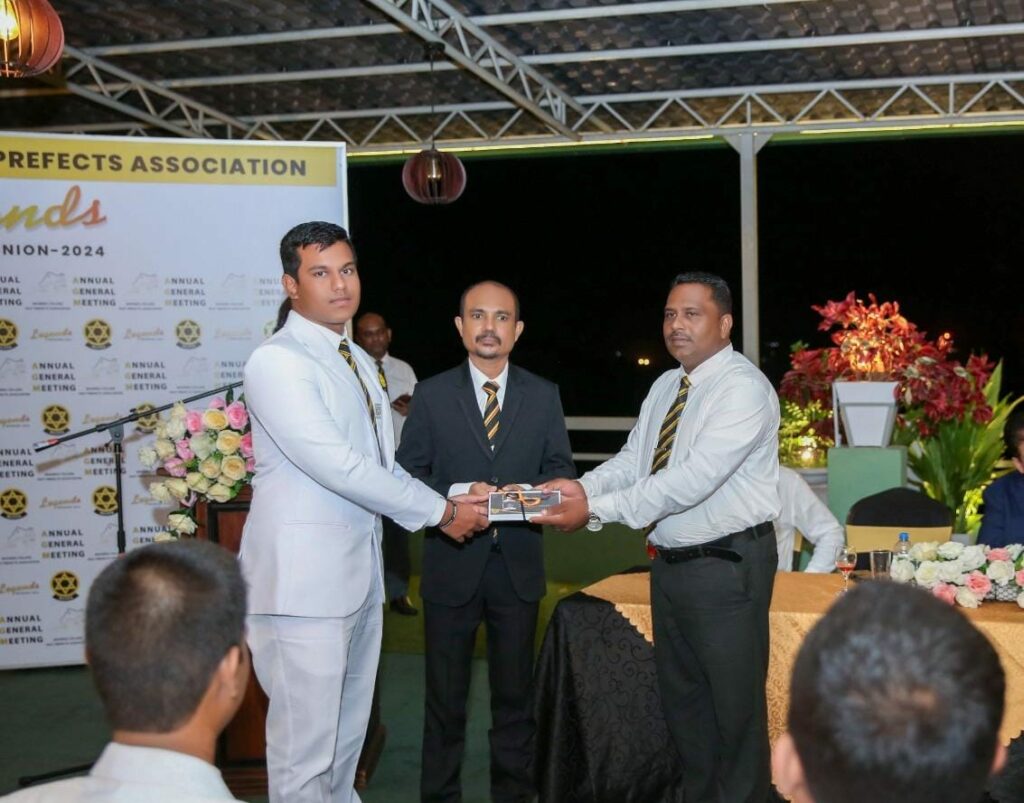Former Sri Lankan Ambassador to Russia, Dr. Saman Weerasinghe, stated that Mahinda College education was the foundation for every role he played in life.
He made this statement on the 17th August as the chief guest at the annual general meeting of the Mahinda College Past Prefects’ Association, held at Mount Rich Hotel in Rumassala, Galle.
The event was also attended by Janaka Peduruhewa, the Principal of Mahinda College, Sampath Ratnayake, the Secretary of the Old Boys’ Association, and many other former and current prefects.
During the event, P.K. Gilbert, who served as the Deputy Principal of Mahinda College from 1991 to 2001, and Mrs. Wasantha Liyanage, who served as a teacher from 1998 to 2017, were honored by the Past Prefect’ Association.
A special moment occurred when the current prefects presented the Mahinda College prefects’ Anthem to the school, marking the first time it was captured in visual media.
Nalin Paranagama, who served as the Chairman of the past prefects’ Association last year, and other officials were re-elected to their positions without contest.
Dr. Saman Weerasinghe addressed the gathering and said:
“I received a scholarship and went to the Soviet Union at a time when I didn’t know a single word of Russian and had no friends there. When I left, the dollar exchange rate was 13 rupees. Despite the challenges, I managed to conclude a 22-year journey at the Kremlin. I remembered this moment when I met President Putin as the Sri Lankan Ambassador to Russia. I have met President Putin four times, which is a great honor for me as a Sri Lankan. Because of this, I was able to contribute significantly to the relationship between Sri Lanka and Russia. The experiences I gained at Mahinda College enabled me to make my life successful.
To achieve this, I followed four principles. First, I learned how to manage failure. I always had a vision for the future. While studying at Moscow Medical Academy, I dreamed of one day becoming the Russian Ambassador of my country. I also served as the Director of International Relations at Moscow Medical Academy for a period of time. I served as an advisor to President Mahinda Rajapaksa for ten years, without receiving any salary. It was because of the connections I had with Russia that he appointed me to that position. Later, I served as Sri Lanka’s Ambassador to Russia. I have also founded several companies in Sri Lanka and Russia as a business entrepreneur. I served as an advisor to the Prime Minister as well. Mahinda’s education was the foundation for all these roles. The education I received at Mahinda College enabled me to achieve anything.
The current prefects will enter society in another year. Some of you will go to university, and others will pursue different careers. By now, these students should have a vision, which should be like a bus ticket to reach their destination. I encourage you to write your life beautifully and become a person who can contribute to society.
Do you know what success in life truly means? If you feel a sense of fulfillment and happiness, that’s where success lies. Since my time at Mahinda College, I have awarded around 650 scholarships to the school. Some of those students have become doctors and engineers. Some have even pursued education in the UK.
At Mahinda College, we gained a strong impression of Buddhism, society, culture, and social service. Because of this, I have made significant contributions to Buddhist temples in remote areas, provided books and scholarships, and offered substantial health assistance.
If doing such things brings joy to a person, then they are successful. Having a large house or an expensive car does not make one successful. It is important to find fulfillment in the contributions you make to society. I urge the prefects here today to make Mahinda shine because of you, just as we have shone because of Mahinda.
If you miss one or two opportunities, don’t give up. Never think that you have failed. You can achieve your goals as long as you have the right mental strength. Never give up on something on the first attempt. I couldn’t get into the Medical Faculty of Sri Lanka on my first attempt. Instead, I was offered a place in the Faculty of Agriculture. My mother was unhappy with this and wanted me to become a doctor. My mother played a significant role in helping me reach my goals.
If I had returned to Sri Lanka and worked as a doctor, I wouldn’t have come this far. After returning from Russia, I decided not to pursue a medical career here and took a significant risk by going back to Russia. My mother also advised me not to return, fearing failure. However, I didn’t give up.
Life is not just about knowledge in one field. We need to have knowledge of various fields in the society we live in. It’s not just about chemistry or physics; we need to have knowledge of economics, politics, and everything else. At Mahinda, because we were part of the Do you know? team, we were encouraged to explore all these subjects. Many of our friends went on to hold prominent positions in Sri Lanka. That learning continues.
The fourth principle is that if we have mental burdens, we need to break them down. Sometimes, even in Colombo, we may only be able to socialize with our school friends. But I have made friends in over 45 countries around the world. This has given me great self-confidence. The four principles I followed were not my own ideas; they were taught by the great scientist Albert Einstein. Einstein highlighted these principles as the keys to success and growth. I have only applied them to my life and shared them with you.
Therefore, I hope to continue serving Mahinda College in the future. I pray that the prefects here today will be in good positions in life when we meet in five or ten years and can say that they have achieved great things because of the influence of Mahinda College.
Always diversify your life. Don’t focus on just one thing. Even if you become a doctor, be more than just a doctor.
Finally, I want to remind you of one more thing. Never forget your parents, siblings, or family for any reason. We should take care of our parents until the end. They expect that from us. This is a valuable part of Sri Lankan culture. Today, these values are gradually disappearing from society. As those who will take responsibility for this society in the future, I urge you to focus on this from now on,” said Dr. Saman Weerasinghe.














